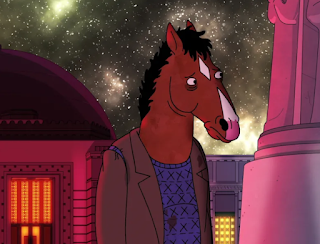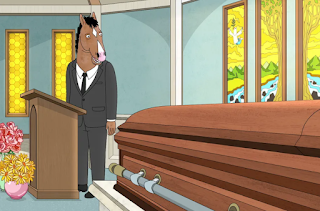There are two hardware stores and two pharmacies, but to buy dog food, we have to drive to the next town, 40 minutes away. There's a self-serve dog wash, but no laundromat.
The absence of a laundromat is significant: there are many people in our community who don't live in nice homes with their own washers and dryers, plus a sizeable number of hikers, fishers, and sailors, who come into town to re-stock. It appears that there was once a laundromat -- one of the many empty and abandoned storefronts -- but it hasn't been in business for at least 15 years.
There is also no drycleaner in the entire North Island. Now that my work attire is even more casual than it was in a suburban library, and Allan works from home, we seldom need a drycleaner anymore. And now I'm careful not to buy any clothes that can't be washed at home. Drycleaning is expensive and bad for the environment, so this is a nice thing to give up.
But then there is my pea jacket. I love my pea jacket. It's a quality garment, in great condition, and could last a very long time. I only need a winter-weight jacket two or three weeks out of the year now. (My big warm parka gets even less use!) So I have no need to replace the pea jacket any time soon.
I would normally have the jacket drycleaned once a year. But that's no longer an option. So the jacket had been looking less and less fresh. Then it went from not fresh to dirty. And dirtier. It really needed a refresh, and I didn't know what to do.
The internet told me it was possible to hand-wash a pea jacket. I was nervous! Would it shrink? Would it get horribly wrinkled? Would it take a month to dry? And would it really get clean?
I'm pleased to say the answers were: no, no, no, and yes. Here are the steps I followed.
1. First I had to find a container big enough to hold a jacket without smushing it, and to allow good flow of water. I used the bathtub.
2. Then I used a lint roller on the jacket and pulled off random dog hair.
3. I put on rubber gloves.
4. I stoppered the drain, and ran cold water into the tub, adding a handwash soap powder. I have Soak, which is awesome (thank you SFYS!), but I didn't think it would be strong enough. I also have some Forever New, and decided to use that. I'm not one to measure things like that, I just poured in some amount and swished it around in the cold water.
5. When the tub was about half full, I submerged the coat in the water. I laid it flat on the bottom of the tub, unbuttoned, with the sleeves on the sides.
6. I set a timer for 15 minutes. Most instructions for handwashing clothes suggest soaking for 15 minutes, so I went with that.
7. When the timer rang, I opened the drain, periodically running the water to let the suds drain.
8. Then, keeping the jacket lying flat, I ran cold water into the tub, and also used a flexible shower attachment to rinse the jacket. I was very pleased to see that the water was very dirty!
9. I rinsed the whole tub repeatedly, each time letting the water re-fill so the jacket was a bit submerged, then letting it drain. The water was less dirty with every rinse.
10. After five rinses, the water was clear -- not dirty, not sudsy.
11. I put a few towels on the bathroom floor, lifted the jack from under the sides -- cradling it so no part was hanging -- and laid it on the towels. This is very important! If you handwash anything made of wool, and hang it while it's wet, the entire garment will stretch out -- and it will never go back into shape. I learned this the hard way with a beautiful sweater my mother made me, in ancient times, pre-internet.
12. After laying the jacket flat on the towel-covered floor, I used dry towels to squeeze out some water, doing one sleeve or one panel at a time. I also carefully turned over the jacket and pressed a dry towel into the fabric on the back. Then I left the jacket on the floor with the bathroom window open.
13. When it became inconvenient to have the bathroom floor covered by a wet pea jacket, I cradled the jacket again and put it on top of a clothes drying rack, careful to place the sleeves flat on the body of the jacket, not hanging down.
14. I left the jacket there for several days, turning it over, turning it inside-out, opening it, and so forth, as it dried. In a few days it was completely dry.
The result: it looks great! The jacket looks fresh and clean. All the dirt and stains are gone, and it's not wrinkled at all.
The only minor negative is the jacket now smells slightly like Forever New. I am very scent-sensitive, and normally use only fragrance-free products. I didn't realize Forever New has a mild scent; for bras and other small hand-washables, it's never been a problem. I might put the jacket back in the tub for another rinse or two, to reduce the smell.
All in all, this was not difficult, and the results were excellent. Thank you, internet!





